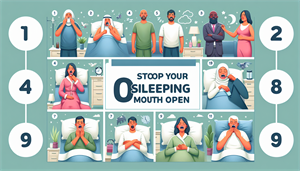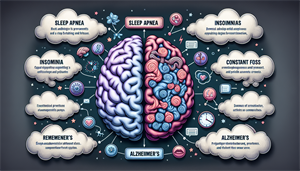
How Do I Stop Sleeping with My Mouth Open at Night?
Have you ever woken up in the middle of the night with a parched mouth and a snoring partner? You may have fallen victim to mouth breathing, a common issue that can rob you of a good night’s sleep and impact your overall health. But don’t worry. You’re about to embark on a journey to a better, healthier sleep pattern. Let’s dive in and find out “how do I stop sleeping with my mouth open at night?”
Key Takeaways
Sleeping with your mouth open can lead to a range of health issues including dry mouth, bad breath, tooth decay, gum disease, and more serious conditions like sleep apnea, which can cause cardiovascular problems and brain damage. Mouth breathing at night can be caused by various factors such as nasal congestion, allergies, deviated septum, obesity, and sleep apnea, leading to poorer sleep quality and systemic health risks. Strategies to promote nasal breathing and stop mouth breathing include clearing nasal passages, adjusting sleep positions, lifestyle changes, mouth taping, using nasal strips or dilators, and consulting specialists as well as improving throat muscle strength with exercises.
The Dangers of Sleeping with Your Mouth Open
Sleeping with your mouth open is more than just a nighttime nuisance. This could signify compromised airway health and potential risks to your overall well-being. It disrupts your sleep by making you more prone to waking up in the night. But that’s not all. It also poses several health risks that range from minor annoyances to severe health conditions, including:
- Dry mouth and throat
- Bad breath
- Tooth decay and gum disease
- Sore throat and hoarseness
- Increased risk of respiratory infections
- Sleep apnea
It’s important to address this issue and find ways to keep your mouth closed during sleep to improve your sleep quality and overall health.
Sleep Apnea and Oxygen Deprivation
Sleep apnea, particularly obstructive sleep apnea (OSA), is a significant sleep disorder that interrupts breathing during sleep and can lead to high blood pressure, stroke, and even potential brain damage. Mouth breathing can worsen this condition by causing relaxation of the soft tissue in your throat, which obstructs your airway and disrupts normal breathing during sleep. Recognizing sleep apnea symptoms is crucial for early diagnosis and treatment. Even worse, these interruptions in breathing can deprive your brain of oxygen, leading to a potential risk of brain damage. Imagine your brain, the command center of your body, not getting enough oxygen. It’s a scary thought, isn’t it? We should explore the ways in which mouth breathing can negatively impact your oral health. Comprehending the potential damage it can cause is crucial.
Oral Health Issues
Mouth breathing can cause dry mouth, which, in turn, promotes bacterial growth, leading to cavities and gum disease. You see, saliva plays a crucial role in controlling harmful germs, and when you breathe through your mouth, saliva production drops, creating a playground for cavities to develop. Additionally, the acidic environment created by mouth breathing can foster bacterial growth, damaging your gum tissues and leading to gum disease. However, the hazards of mouth breathing extend beyond this. Let’s explore how it impacts your overall health.
Impact on Overall Health
Mouth breathing doesn’t just affect your sleep and oral health. It can also contribute to heart disease by decreasing the release of nitric oxide, a crucial player in cardiovascular health, and by increasing the risk of sleep apnea. Sleep apnea is associated with serious health complications like coronary heart disease, heart failure, and stroke, making it a significant concern for mouth breathers. Furthermore, mouth breathing can hamper sleep quality, resulting in diminished memory, learning ability, and focus. And if that’s not enough, mouth breathing can also lead to chronic fatigue and daytime sleepiness, affecting your overall productivity and quality of life.

